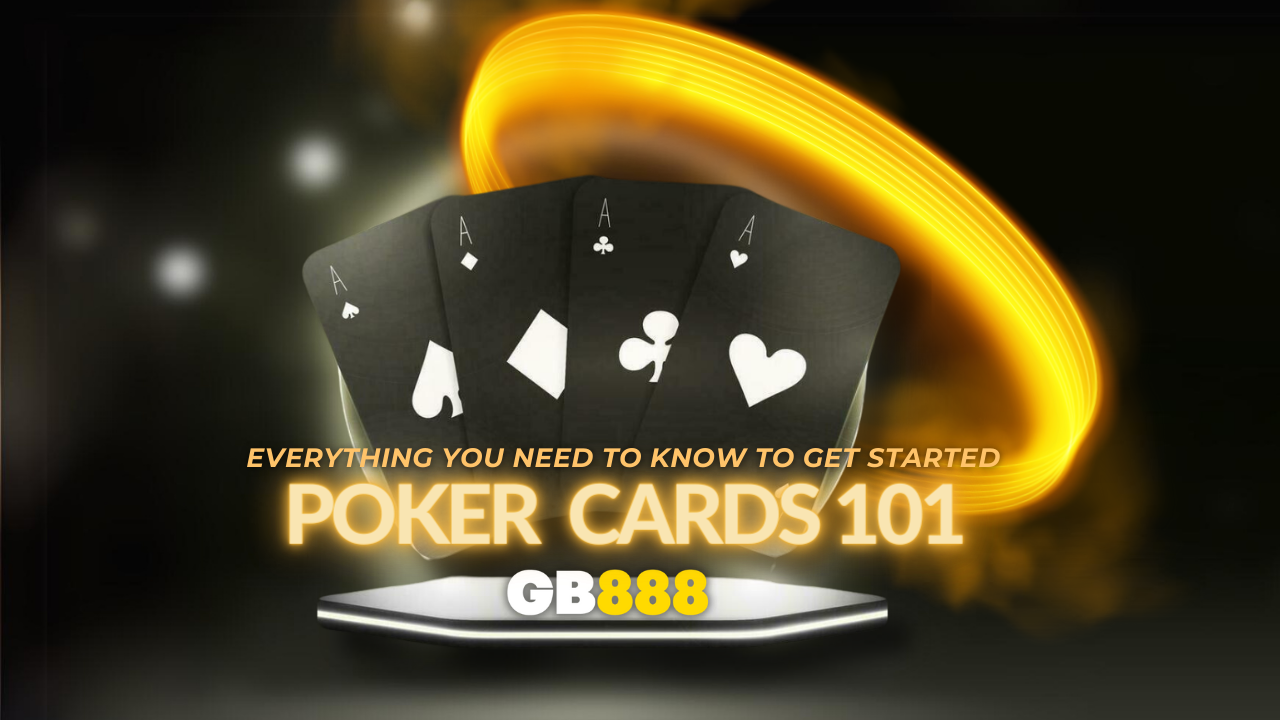What are Poker Cards?
Poker cards, also known as playing cards, boast a rich history dating back centuries, evolving alongside the game of poker itself. Crafted with precision and enhanced with intricate designs, these cards are more than the basic tools of the game, and they symbolize tradition, strategy, and the thrill of competition. From the elegant simplicity of their design to the real satisfaction of shuffling and dealing, Gb888 poker cards contain the essence of the game, captivating players and spectators alike with their timeless appeal.

With each card carefully crafted to withstand the accuracy of countless hands and the careful examination of clever players, these decks serve as the canvas upon which poker’s stories unfold, making them an essential component for every poker enthusiast. A standard deck consists of 52 cards, divided into four suits (hearts, diamonds, clubs, and spades). Each suit contains 13 ranks, from Ace (highest) to 2 (lowest). Understanding these cards is the key to playing poker effectively.
The Basics of Poker Cards
The basics of poker cards are foundational to the game’s essence. At their core, poker cards consist of a standard deck comprising 52 cards, divided into four suits: hearts, diamonds, clubs, and spades. Each suit features thirteen cards, including numbered cards ranging from 2 to 10 and face cards consisting of the Jack, Queen, King, and Ace. The complexities of poker hands and strategies build upon this structure.
- Poker Hands: Poker hands are combinations of cards that determine the winner in each round. Familiarize yourself with hand rankings, such as royal flush, straight flush, four of a kind, full house, flush, straight, three of a kind, two pair, one pair, and high card.
- Understanding Poker Hands: Learn how to recognize different hand combinations during gameplay. For instance, a straight flush consists of five consecutive cards of the same suit.
- Card Rankings: Memorize the order of card ranks, from Ace (highest) to 2 (lowest).
Types of Poker Games
Poker offers a variety of game types, each with its own set of rules and strategies. Some popular variants include:
Texas Hold’em
- Texas Hold’em is the most popular poker variant.
- Players receive two private cards (hole cards) and use five community cards to form the best hand.
- Betting rounds include pre-flop, flop, turn, and river.
Omaha
- Similar to Texas Hold’em, players receive four hole cards.
- Players must use exactly two hole cards and three community cards to create their hand.
Seven-Card Stud
- Each player receives seven cards (three face-down and four face-up).
- Players aim to make the best five-card hand from their seven cards.
Basic Rules and Gameplay
Anyone looking to start in the world of poker must understand the basic rules and gameplay mechanics.
Dealing the Cards
The dealer distributes cards to players, starting with the player to their left and continuing clockwise around the table.
Betting rounds
Betting rounds occur throughout the game, allowing players to bet, raise, or fold based on the strength of their hand and their confidence in winning.
Showdown
At the conclusion of the final betting round, players reveal their hands in the showdown, and the hand rankings determine the winner.
Essential Poker Strategies
Essential poker strategies are fundamental for success in the game, requiring a combination of skill, intuition, and calculated decision-making. Here are some Gb888 key strategies to elevate your gameplay:
- Starting Hand Selection: Choose your hands wisely, focusing on playing strong starting hands while folding weaker ones. Understanding hand strength and position is crucial for making informed decisions.
- Positional Awareness: Utilize your position at the table to your advantage. Act decisively when in a favorable position, and exercise caution when out of position. Positional awareness allows you to maximize opportunities and minimize risks.
- Reading Opponents: Observe your opponents’ tendencies and betting patterns to gain insight into their playing style. Look for signs and cues that may reveal the strength or weakness of their hands. Adapting your strategy based on opponent behavior can give you a significant edge.
- Bankroll Management: Manage your bankroll effectively to avoid unnecessary risks and ensure long-term sustainability. Set limits on the amount you’re willing to wager and avoid chasing losses. A disciplined approach to bankroll management is essential for weathering fluctuations and capitalizing on opportunities.
- Bet Sizing: Adjust your bet sizes strategically to extract maximum value from strong hands and minimize losses with weaker ones. Avoid telegraphing the strength of your hand through consistent bet sizing, and vary your bets to keep opponents guessing.
- Bluffing and Semi-Bluffing: Incorporate bluffing and semi-bluffing into your gameplay to keep opponents off balance. Bluff selectively and consider factors such as table dynamics, opponent tendencies, and board texture when deciding to bluff or semi-bluff.
- Hand Reading and Range Analysis: Develop the ability to read hands and analyze opponent ranges based on their actions throughout the hand. Consider factors such as pre-flop betting, post-flop aggression, and board texture to narrow down potential holdings and make informed decisions.
By incorporating these essential poker strategies into your gameplay, you can enhance your performance, increase your win rate, and achieve success at the tables. Remember that mastering poker is a journey of continual learning and refinement, so stay committed to honing your skills and evolving as a player.
Conclusion
Mastering poker cards involves knowing the basics of poker cards, and with essential strategies at your fingertips, you’re ready to embark on your journey to becoming a skilled poker player. Start playing, start winning, and enjoy the thrill of the game with Gb888 Poker Cards 101!
- Privacy & Policy
- Terms & Conditions
- About Us
- Contact Us
- Address: 163 Lorong 1 Toa Payoh 01-1004, Singapore
- Email: [email protected]
- Hotline: +65 9184 8888
- Website: gb888casino.org